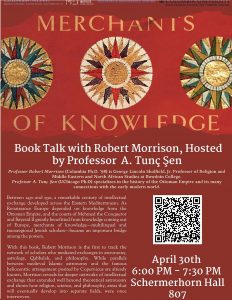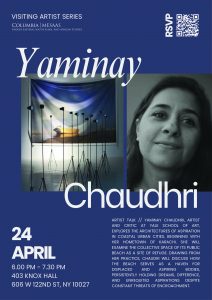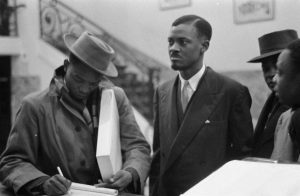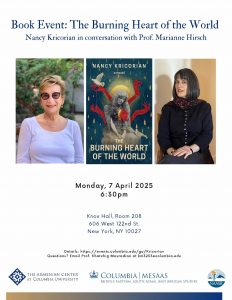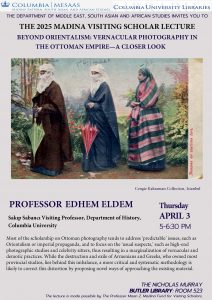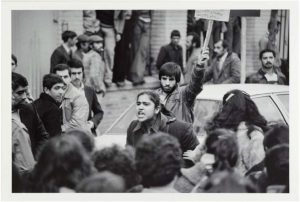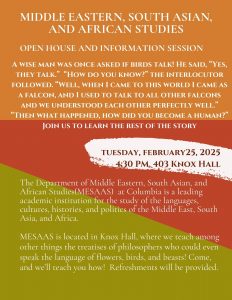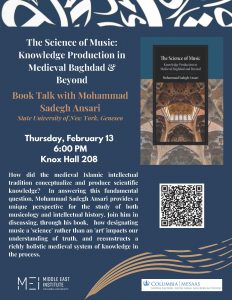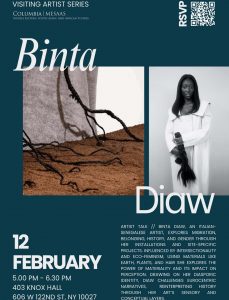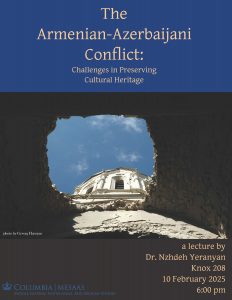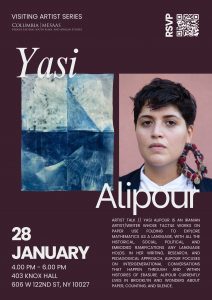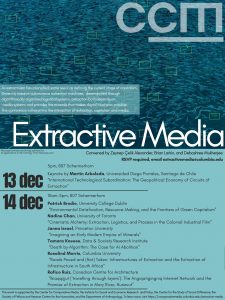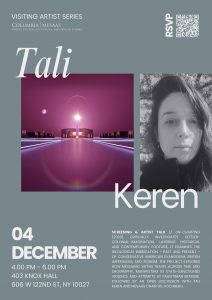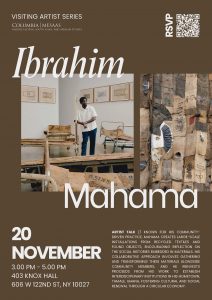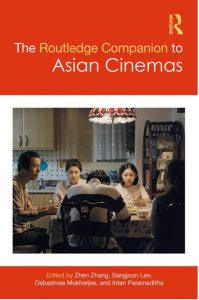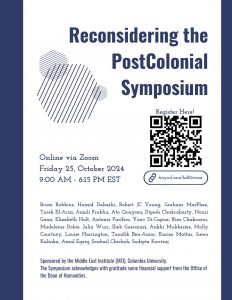EVENTS
PAST EVENTS (Hiding empty months)
april 2025
Event Details
We are excited to announce the launch of the Lumumba at 100 series, a graduate student-led initiative commemorating the 100th anniversary of Patrice Lumumba’s life and legacy.
more
Event Details
We are excited to announce the launch of the Lumumba at 100 series, a graduate student-led initiative commemorating the 100th anniversary of Patrice Lumumba’s life and legacy.
Lumumba at 100 – April 18, 2025, 10:00 AM
Featuring scholars Georges Nzongola-Ntalaja, Didier Gondola, Pedro Monaville
Maison Française, Buell Hall, 515 W 116th St, New York, NY 10027
RSVP (RSVP required 48 hours in advance for non-CU ID holders)
CALL FOR PAPERS (Deadline: March 15, 2025)
Lumumba at 100 will include a cross-disciplinary conference and workshop, featuring discussions and lectures on Congo’s colonial history, Lumumba’s leadership, and ongoing struggles in the region, with an emphasis on global challenges like resource extraction and political instability. Leading scholars and early-career scholars will come together for engaging dialogues and critical feedback.
Current Supporters & Collaborators:
Department of Middle East, South Asian and African Studies, Department of Art History & Archaeology, Institute of African Studies, Middle East Institute, Maison Française, Just Humanities Initiative, The Society for Fellows and the Heyman Center for the Humanities, Department of History, Department of French, Department of Anthropology, African Student Association, Friends of the Congo, SIPA Pan African Network
For more information, upcoming programs, and updates, see our website.
We hope you can join us for these events.
Best regards,
The Lumumba at 100 Organizing Team
Time
(Friday) 10:00 am
Location
Maison Française
Buell Hall
3apr - 5apr 36:00 pmapr 5Celebrating the Career of Professor Souleymane Bachir Diagne
Event Details
Thursday, April 3, 6:30-8:00 PM In Praise of the Universal Keynote Lecture by Souleymane Bachir Diagne Location to be announced RSVP HERE
more
Event Details
Thursday, April 3, 6:30-8:00 PMKeynote Lecture by Souleymane Bachir DiagneLocation to be announcedRSVP HEREFriday, April 4 and Saturday April 5, 10:00 AM-4:00 PMWith contributions by:Salim Abdelmadjid, Mouhamadou El Hady BA, Alioune Bah, Etienne Balibar, Akeel Bilgrami, Ali Benmakhlouf, Françoise Blum, Charles Bowao, Jean-Godefroy Bidima, Hamid Dabashi, Daniel Dauvois, Vishaka Desai, Penelope Lisa Deutscher, Mamadou Diouf, Thomas Dodman, Pierre Force, Lewis R. Gordon, Philippe Gouët, Chike Jeffers, Nadia Yala Kisukidi, Anais Maurer, Ramatoulaye Diagne Mbengue, Bado Ndoye, Nasrin Qader, Emmanuelle Saada, Felwine Sarr, Achille Varzi, Gary Wilder, Frédéric Worms, and Souleymane Bachir Diagne.East Gallery, Maison Française, Buell HallRSVP HEREThis conference is organized by the Columbia University Maison Française and Department of French, with additional support provided by Columbia’s Institute of African Studies, Office of the Dean of Humanities, Department of Philosophy, Committee on Global Thought, SOF/Heyman Center for the Humanities, Alliance Program, Arts and Sciences, and MESAAS, and by Villa Albertine, Cultural Services of the Embassy of France.
Time
3 (Thursday) 6:00 pm - 5 (Saturday) 4:00 pm
Location
Maison Française
Buell Hall
march 2025
Event Details
What can museums tell us about a nation’s self-image? How does Germany approach its colonial past in light of the Holocaust? Berlin’s national museums have become the focus of current
more
Event Details
What can museums tell us about a nation’s self-image? How does Germany approach its colonial past in light of the Holocaust? Berlin’s national museums have become the focus of current debates around repatriation and colonial collections – most visibly those now housed inside the contested Humboldt Forum. But the Humboldt Forum is just the beginning. This talk moves beyond the ethnological collections inside the resurrected Prussian castle in the center of Berlin. It ties recent discussions to other, hitherto neglected sites, such as the seemingly unproblematic antiquity collections from the former Ottoman Empire on Berlin’s Museum Island, and collections of human remains from ‘German East Africa’ held in the storage facilities on the city’s periphery. How were all these collections entangled not only with each other but also with global networks of trade, material extraction and exploitative labour? In the late nineteenth century, these collections were furthermore exploited to consolidate triumphalist narratives of ‘Western civilization’ and human history – not least by providing the raw materials for a new form of ‘scientific’ antisemitism and racism that developed around 1900 onwards: with fatal consequences in the twentieth century. In spite of these problematic legacies, however, Berlin’s urban center still reflects an imperial mindset in the wake of an affirmative monumentalization of the Wilhelmine era. This tells us as much about race and memory politics in Germany today.
Following the lecture, Mirjam Brusius will be joined in conversation by Professor Avinoam Shalem, Riggio Professor of the History of the Arts of Islam (Columbia University). A reception will conclude the evening.
This event is free and open to the public. Registration is required. https://germanic.columbia.edu/events/skulls-sculptures-and-kaisers-museums
Mirjam S. Brusius is a cultural historian with a PhD in the History and Philosophy of Science from the University of Cambridge and an MA from the Humboldt-Universität zu Berlin. Currently, Mirjam is a Research Fellow in Colonial and Global History at the German Historical Institute London.
Each year the annual Mosse Lecture, presented by the Columbia Department of Germanic Languages, seeks to honor the legacy of the progressive Mosse publishing house founded by Rudolf Mosse, which helped to shape the democratic public sphere during the German Weimar Republic. Descendants of the Mosse Family include Prof. George L Mosse, the acclaimed historian of fascism, Dr. Hilde L. Mosse, a distinguished child psychiatrist who worked with Harlem children suffering from reading disabilities, Hans Strauch, an accomplished architect, and Roger Strauch, a successful high technology entrepreneur and venture capitalist. Hans and Roger co-lead The Mosse Foundation’s efforts to sustain and promote the Mosse Family’s philanthropic legacy to support distinguished educational, research, health, and arts institutions and progressive causes.
Time
(Thursday) 6:00 pm
Location
Deutsches Haus
420 W. 116 St
12mar6:30 pm‘Where Is Abbas Kiarostami?’: A Conversation with Hamid Dabashi
Event Details
Please join us for a special event celebrating Where Is Abbas Kiarostami?, the latest book by renowned scholar Hamid Dabashi, exploring the legacy of one of cinema’s greatest visionaries.
more
Event Details
Please join us for a special event celebrating Where Is Abbas Kiarostami?, the latest book by renowned scholar Hamid Dabashi, exploring the legacy of one of cinema’s greatest visionaries.
Featuring:
Hamid Dabashi, Author and Hagop Kevorkian Professor of Iranian Studies and Comparative Literature
Jane Gaines, Professor, Film and Media Studies, Columbia University; Professor Emerita of English & Literature, Duke University
Hisham Matar, Pulitzer Prize-Winning Author and Professor of Professional Practice in Comparative Literature and Translation at Barnard College.
Moderated by Ramin Bahrani, Oscar-nominated filmmaker and Associate Professor of Professional Practice, Film
Sponsored by:
Columbia University School of the Arts
Film Program
Film and Media Studies Program
Center for Comparative Media
Department of Middle Eastern, South Asian, and African Studies (MESAAS)
For more information, click here: https://www.lenfest.arts.columbia.edu/spring-2025-events/where-is-abbas-kiarostami-a-conversation-with-hamid-dabashi
Time
(Wednesday) 6:30 pm
Location
Lenfest Center for the Arts
12mar6:00 pmSoundtrack to a Coup d'EtatScreening and discussion with Director Johan Grimonprez
Event Details
SCREENING of Soundtrack to a Coup d’État March 12, 2025 - 6:10 PM Alfred Lerner Hall, 2920 Broadway,
more
Event Details
SCREENING of Soundtrack to a Coup d’État
March 12, 2025 – 6:10 PM
Alfred Lerner Hall, 2920 Broadway, New York, NY 10027
Followed by a moderated discussion with Director Johan Grimonprez
RSVP (RSVP required 48 hours in advance for non-CU ID holders)
2025 Oscar® nominee for Best Documentary Feature. United Nations, 1960: the Global South ignites a political earthquake, jazz musicians Abbey Lincoln and Max Roach crash the Security Council, Nikita Khrushchev bangs his shoe, and the U.S. State Department swings into action, sending jazz ambassador Louis Armstrong to Congo to deflect attention from the CIA-backed coup. Director Johan Grimonprez captures the moment when African politics and American jazz collided in this magnificent essay film, a riveting historical rollercoaster that illuminates the political machinations behind the 1961 assassination of Congo’s leader Patrice Lumumba. Richly illustrated by eyewitness accounts, official government memos, testimonies from mercenaries and CIA operatives, speeches from Lumumba himself, and a veritable canon of jazz icons, Soundtrack to a Coup d’Etat interrogates colonial history to tell an urgent and timely story of precedent that resonates more than ever in today’s geopolitical climate.
Time
(Wednesday) 6:00 pm
Location
Lerner Hall
7mar12:00 pmNot Your Usual Resistance
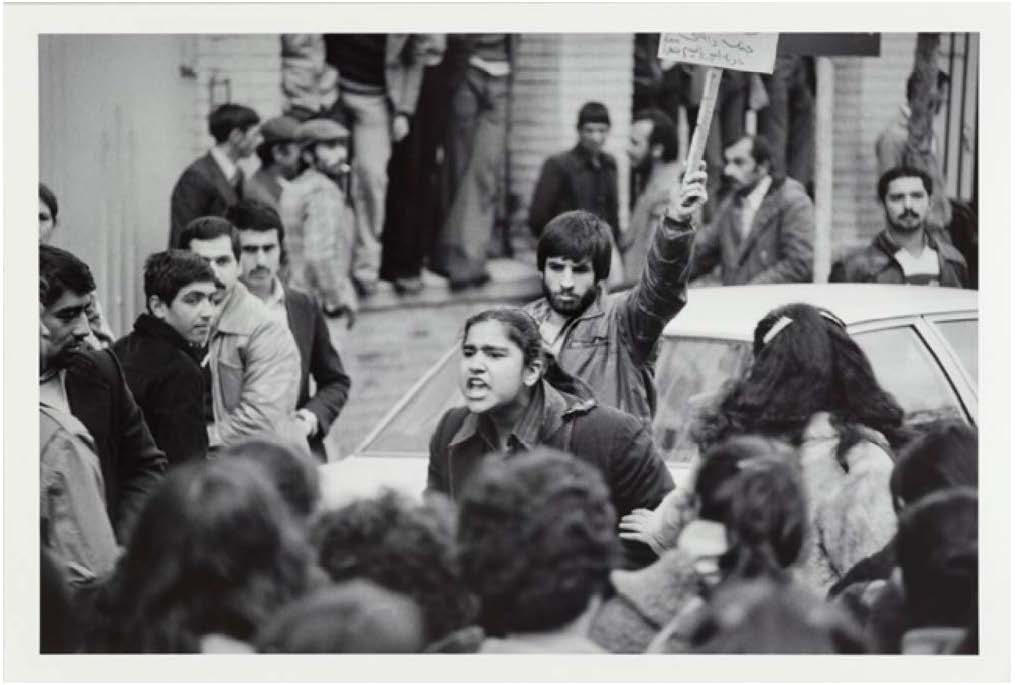
Event Details
Event link: https://sofheyman.org/events/not-your-usual-resistance Habibe Jafarian and her translator, Salar Abdoh, will discuss the advent of
more
Event Details
Habibe Jafarian and her translator, Salar Abdoh, will discuss the advent of the contemporary personal essay form in Iran, its relation to the larger direction of her work as an editor and biographer, and the politics of its translation. This event will be conducted in conversation with Professor Mana Kia and focus on how Jafarian’s work articulates the experiences and perspectives of a professional woman in Iran that are often in contrast to usual representations in English.This event is part of the Against the Grain: Gender and the Fraught Politics of Translation in Persophone World series. These spring events are themed, “In Their Own Words: Iranian Lives and the Personal Essay.” Learn more about the series here.
Friday, March 7, 2025, 12:00 pm EST | In person at the Heyman Center and via ZoomRegistration requiredCU/BC ID holders must also register in advanceCo-sponsored by Heyman Center Fellows, Institute for Comparative Literature and Society, Middle East Institute, and the Department of Middle Eastern, South Asian, and African Studies
Time
(Friday) 12:00 pm
Location
Heyman Center
february 2025
12feb5:00 pmMESAAS Visiting Artist Series with Binta Diaw
Event Details
We are excited to invite you to our next MESAAS Visiting Artist Series events. This series invites
more
Event Details
We are excited to invite you to our next MESAAS Visiting Artist Series events. This series invites artists from the Middle East, South Asia, and Africa to share their work through open discussions, screenings, and workshops. Join us for these special opportunities to engage with the artists’ practices and their insights into the social and political contexts shaping their work.
February 12, 2025
5-6.30PM – 403 Knox Hall
Binta Diaw, an Italian-Senegalese artist, explores migration, belonging, history, and gender through her installations and site-specific projects. Influenced by intersectionality and eco-feminism, using materials like earth, plants, and hair she explores the power of materiality and its impact on perception. Drawing on her diasporic identity, Diaw challenges Eurocentric narratives, reinterpreting history through her art’s sensory and conceptual layers.
RSVP here
Time
(Wednesday) 5:00 pm
Location
403 Knox Hall
january 2025
28jan4:00 pm- 6:00 pmMESAAS Visiting Artist Series with Yasi Alipour
Event Details
We are excited to invite you to our next MESAAS Visiting Artist Series event. This series invites artists from the Middle
more
Event Details
We are excited to invite you to our next MESAAS Visiting Artist Series event. This series invites artists from the Middle East, South Asia, and Africa to share their work through open discussions, screenings, and workshops. Join us for these special opportunities to engage with the artists’ practices and their insights into the social and political contexts shaping their work.
Join us for a conversation with Yasi Alipour, an Iranian artist/writer whose tactile works on paper use folding to explore mathematics as a language, with all the historical, social, political, and embodied ramifications any language holds. In her writing, research, and pedagogical approach, Alipour focuses on intergenerational conversations that happen through and within histories of erasure. Alipour currently lives in Brooklyn and wonders about paper, counting, and silence.
RSVP here
Time
(Tuesday) 4:00 pm - 6:00 pm
Location
403 Knox Hall
december 2024
4dec4:00 pmMESAAS Visiting Artist Series with Tali Keren
Event Details
December 4 - Screening & Artist Talk with Tali Keren 4:00-6:00 PM 403 Knox Hall Please join
more
Event Details
December 4 – Screening & Artist Talk with Tali Keren
4:00-6:00 PM
403 Knox Hall
Please join us for the screening of Un-Charting (2023) by Tali Keren, followed by an open discussion with MESAAS Chair Gil Hochberg. Part of a trilogy, this film critically examines the settler-colonial imagination, tracing connections between conservative American Evangelism, British imperialism, and Zionism. Layering historical sources and contemporary documentary footage, Un-Charting examines the ideological imbrication – past and present – of conservative American Evangelism, British imperialism, and Zionism. The project investigates how messianic myths travel across time and geography, manifesting in state-sanctioned violence and attempts at Palestinian erasure. While the work pre-dates October 7, it reveals part of the genocidal mechanisms we are witnessing in Gaza today. The work aims to uncover the complexities of the connection between the US and Israel that extend beyond political alliances into the belief systems and rituals of the American Christian right.
RSVP here
We look forward to seeing you there,
MESAAS, Columbia University
Time
(Wednesday) 4:00 pm
Location
403 Knox Hall
november 2024
20nov3:00 pmMESAAS Visiting Artist Series with Ibrahim Mahama
Event Details
November 20 - Artist Talk with Ibrahim Mahama 3:00-5:00 PM 403 Knox Hall Join us for a conversation
more
Event Details
November 20 – Artist Talk with Ibrahim Mahama
3:00-5:00 PM
403 Knox Hall
Join us for a conversation with Ibrahim Mahama, an artist known for his innovative, community-driven installations using recycled textiles and found objects to explore the social histories embedded within these materials. Mahama’s collaborative practice involves transforming these items with local communities, reinvesting proceeds from his work to create interdisciplinary cultural institutions in his hometown of Tamale, Ghana, promoting cultural renewal through a sustainable, circular economy.
RSVP here
Time
(Wednesday) 3:00 pm
Location
403 Knox Hall
6nov5:15 pm- 6:30 pmBook Launch: The Routledge Companion to Asian Cinemas
Event Details
WE ARE PLEASED TO ANNOUNCE A BOOK LAUNCH FOR THE ROUTLEDGE COMPANION TO ASIAN CINEMAS EDITED BY ZHEN ZHANG, SANGJOON LEE, DEBASHREE MUKHERJEE, & INTAN PARAMADITHA PRESENTED BY THE ASIAN FILM
more
Event Details
WE ARE PLEASED TO ANNOUNCE A BOOK LAUNCH FOR
THE ROUTLEDGE COMPANION TO ASIAN CINEMAS
EDITED BY ZHEN ZHANG, SANGJOON LEE, DEBASHREE MUKHERJEE, & INTAN PARAMADITHA
PRESENTED BY THE ASIAN FILM & MEDIA INITIATIVE (AFMI), NYU
JOIN US ON WEDNESDAY, NOVEMBER 6, 2024
5:15pm-6:30pm
Performance Studies Studio, 6th Floor, Tisch School of the Arts (721 Broadway)
Followed by reception.
Asian cinema studies has rapidly expanded under the impact of globalization, compounded by the resurgence of varied nationalisms, resistance movements, and the affordances of digital media. Differentiated experiences of climate change and the COVID-19 pandemic have further heightened interest in local politics and cultural activism, newer media and the digital everyday, and a renewed geopolitical divide between East and West and between North and South. A new “companion” to Asian cinemas therefore feels necessary and urgent in these times. This collaborative volume takes up emerging questions in the field to weave a model for a “trans-Asian” film studies that is cognizant of the durability of the nation state as well as alternative models of situated multiscalar ideas of place and belonging.
Time
(Wednesday) 5:15 pm - 6:30 pm
Location
Performance Studies Studio, Tisch School of the Arts
721 Broadway
october 2024
21oct12:00 pmMESAAS Undergraduate Open House and Information Session
Event Details
Monday, October 21, 2024 12PM, 403 Knox Hall Featuring current MESAAS majors and faculty, who will give an introduction to MESAAS. Open to all undergraduates
Event Details
Time
(Monday) 12:00 pm
Location
403 Knox Hall
12oct - 19All DayNew York Kurdish Film Festival
Event Details
The New York Kurdish Film Festival, established in 2017, takes place every fall over several days. In recent years, the festival’s venue has been the landmark theater Village East by
more
Event Details
The New York Kurdish Film Festival, established in 2017, takes place every fall over several days. In recent years, the festival’s venue has been the landmark theater Village East by Angelika, located in Manhattan’s East Village.
The festival’s program typically features a mix of short and feature-length films, dramas, documentaries, and animations, from diverse regions of Kurdistan. The films’ directors may be either Kurdish or non-Kurdish. Many of the films have their American premieres here.
For more information and locations of specific screenings and discussions, click here: New York Kurdish Film Festival
Time
october 12 (Saturday) - 19 (Saturday)
august 2024
30aug1:00 pm- 4:00 pmPersian Placement Test
Event Details
Persian: The Persian placement test will be held Friday, August 30th, 1:00 – 4:00 pm in Knox Hall 101. Please contact Saeed Honarmand at sh3468@columbia.edu.
Event Details
Persian: The Persian placement test will be held Friday, August 30th, 1:00 – 4:00 pm in Knox Hall 101. Please contact Saeed Honarmand at sh3468@columbia.edu.
Time
(Friday) 1:00 pm - 4:00 pm
Location
101 Knox Hall
30aug10:00 am- 1:00 pmHindi-Urdu Placement Test
Event Details
Hindi-Urdu: The Hindi-Urdu faculty will administer written Placement and Proficiency Tests in Hindi and Urdu from 10:00 am to 1:00 pm on Friday, August 30th 2024 in Knox Hall 114 and
Event Details
Hindi-Urdu: The Hindi-Urdu faculty will administer written Placement and Proficiency Tests in Hindi and Urdu from 10:00 am to 1:00 pm on Friday, August 30th 2024 in Knox Hall 114 and 116. While the proficiency test is to fulfill the Columbia University language requirement, the placement test is to place a student in our existing Hindi and Urdu courses. Hindi and Urdu tests are separate. Please contact Rakesh Ranjan at rr2574@columbia.edu for more information.
Time
(Friday) 10:00 am - 1:00 pm
Location
114 & 116 Knox Hall
30aug10:00 am- 1:00 pmArabic Placement Test
Event Details
Arabic: The Arabic Placement Exam will be on Friday, August 30, 10am-1pm in Knox Hall 101 and 103.Please contact Taoufik Ben Amor at tb46@columbia.edu Students may register for the course that they
Event Details
Arabic: The Arabic Placement Exam will be on Friday, August 30, 10am-1pm in Knox Hall 101 and 103.Please contact Taoufik Ben Amor at tb46@columbia.edu
Students may register for the course that they estimate would fit their level pending the results of the exam.
Time
(Friday) 10:00 am - 1:00 pm
Location
101 & 103 Knox Hall
29aug10:00 am- 1:00 pmHebrew Placement Test
Event Details
Hebrew: The Hebrew placement test will be held Thursday, August 29th, 10:00am-1:00pm. in Knox Hall 101 and 103. Please contact Naama Harel at nh2508@columbia.edu
Event Details
Hebrew: The Hebrew placement test will be held Thursday, August 29th, 10:00am-1:00pm. in Knox Hall 101 and 103. Please contact Naama Harel at nh2508@columbia.edu
Time
(Thursday) 10:00 am - 1:00 pm
Location
101 & 103 Knox Hall


